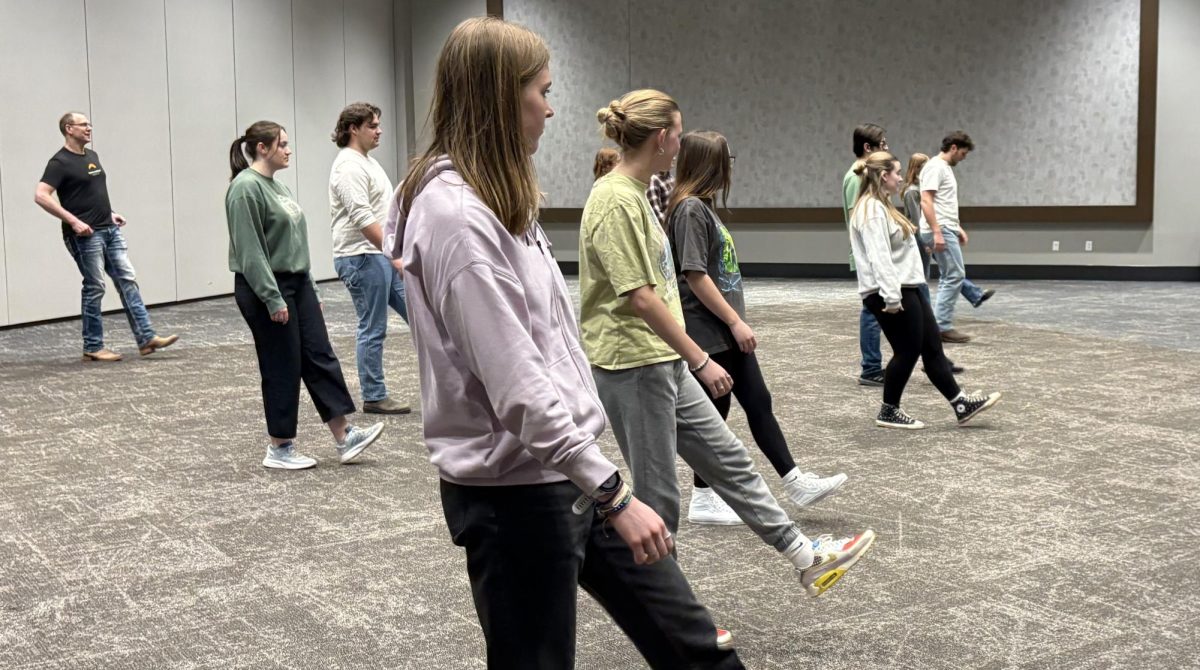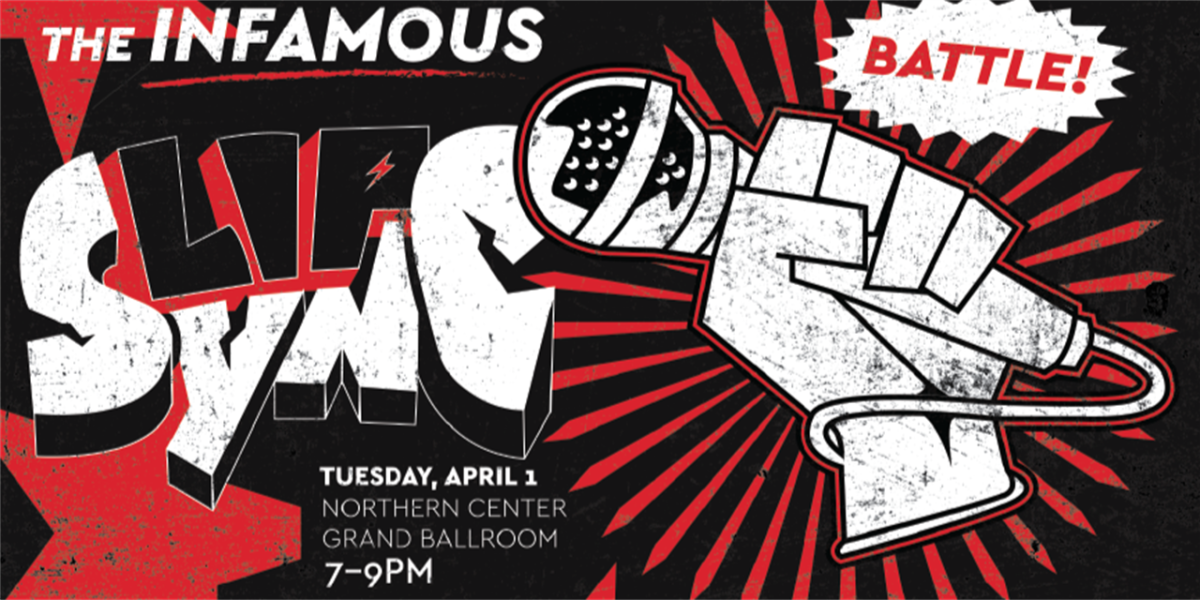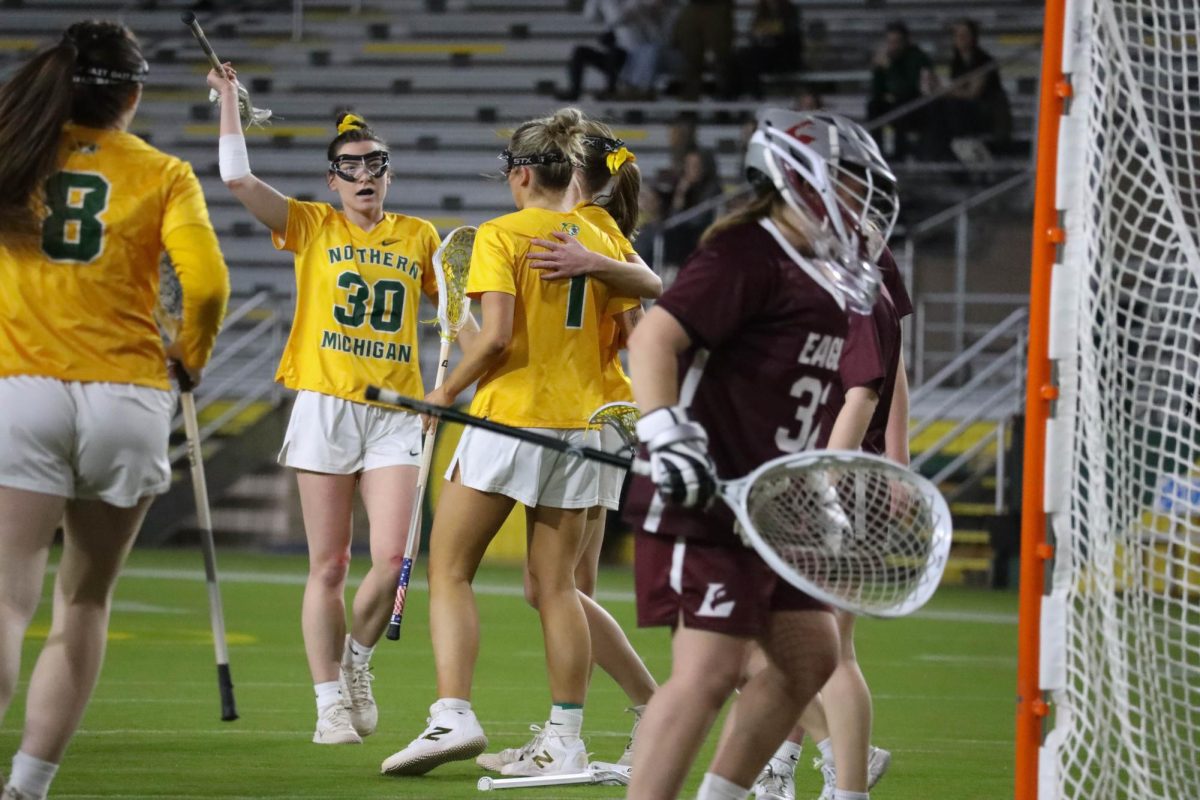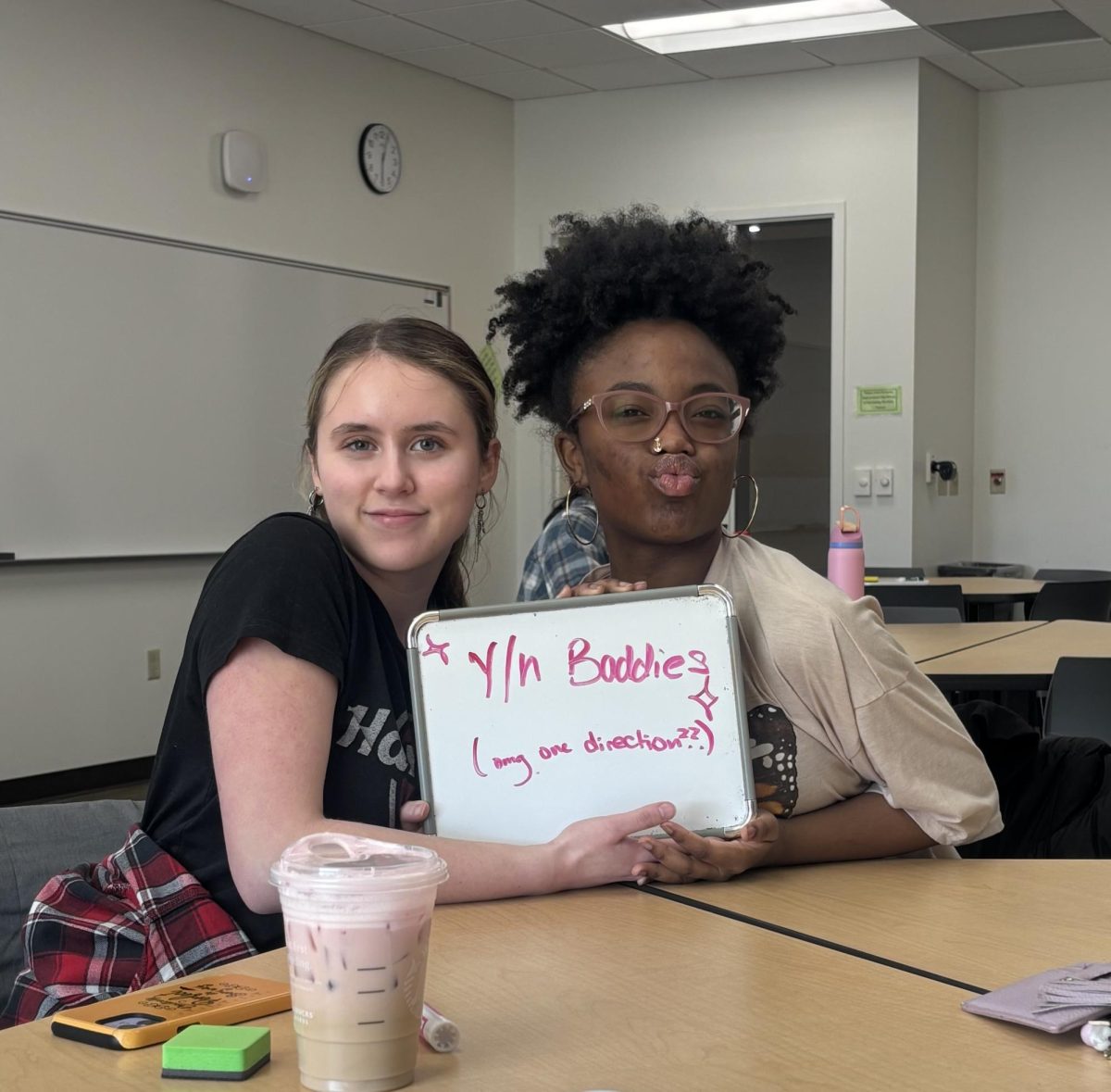Human rights activist Ayaan Hirsi Ali spoke on Wednesday, March 31, in the Great Lakes Rooms of the University Center about the threat presented by Islamic social doctrine to human rights. About 450 students and community members attended the Platform Personalities event.
“It’s very important to know that Islam as a theology, the political and social dimension of Islam, and not the religious aspects, are not just dangerous but also incompatible with the American doctrine of life, liberty, and the pursuit of happiness,” Ali said.
Ali’s speech, titled “Refuse to be Silenced,” reflected on her experiences with inequality towards women in the Muslim world that she grew up in. Ali called inequality a universal issue but also said there are some major problems faced by Muslim women that most Western women will never face.

“There is female genital mutilation that happens at the age of 5, 6 or 7 that is a sewing of the genitals and the cutting off of the clitoris to ensure that you are a virgin when you reach the age of marriage,” Ali said. “It’s justified in the name of Islam even though it’s not in the Qur’an.” In Ali’s book, “Infidel,” Ali described that while her parents were against genital mutilation, Ali’s grandmother performed the procedure while her parents were away from home.
Ali said she wanted to show that a person born into Islam can change their mind about their religion, even though it is quite dangerous to do so. She said by going against her religion, she faced immediate rejection from her family. After a marriage was arranged for her, Ali decided to seek asylum in the Netherlands.
“I didn’t want to be caught by my father, or the man who he married me off to. I felt the most threatened when I was discovered by my husband,” Ali said.
Ali said a social worker told her that she didn’t have to fear her husband, that she didn’t have to follow him and the police could ensure her safety.
One of the biggest problems Ali mentioned is that the peace-loving and law-abiding majority of Muslims turn a blind eye to the injustices that occur often in their culture.
“When Muslims commit violent crimes in the name of the Qur’an … the peace-loving majority goes into denial, they become defensive,” she said. “I’ve also observed that there’s a willful disregard of facts. It doesn’t matter how many verses of the Qur’an you show, they will say it has nothing to do with Islam and that Islam is peace.”
Ali said ignoring the problem only makes it easier for the mistreatment of women to become accepted and perpetuated.
She also said that while there is a universal history of excluding certain groups of people, whether it’s women, gay people, or other minorities, the main difference in Islamic Sharia (Law) doesn’t allow changes or amendments.
“When I came (to the U.S.) I found out that as far as the Constitution goes, I can fight the exclusion, I can influence congressmen to enact change,” she said.
Ali said she was attracted to the U.S. because of the freedom of expression and the freedom to dissent. Under Islamic Sharia, Ali said women have to be especially careful to not speak out because men are typically warned and then intimidated before finally being attacked, but women are not so lucky.
“As a woman, if you want to change anything you’re declared sinful. It is creed that a woman’s testimony is worth half a man’s and her testimony means little,” Ali said.
Ali said some men use Islamic Sharia to justify beating a woman for as little as leaving the house without the permission of her male guardian. The guardian is usually her husband, but if the woman is unmarried, her father, older brother or uncle would take on that role.
In extreme cases, Ali said the guardian could even sell a woman for an indeterminate amount of money, and that while some groups consider it immoral, extremists use circular thinking to make the ends justify the means.
Junior Melanie Bell, chairperson for the event, said Ali has a unique viewpoint being an apostate in the eyes of her Muslim family and friends.
“Ali has faced adversity in her life that most will never come close to knowing,” Bell said.
Bell also said that because of her outspoken nature, Ali has angered some Islamic extremists.
“Her short film ‘Submission,’ about the oppression of women under the Islamic faith, drew great attention,” she said.
Even though Ali has become a target of Islamic extremists who wish to silence her, she continues speaking because the message she conveys transcends the blind hatred of radicals.
“As more people become aware of the violence, it will become more difficult for people to ignore it,” Ali said.
Harris said she hopes people stop ignoring these injustices towards women and call for action.
“I would like people to learn about what (Ali has) endured and what other women are still enduring. Hopefully we can not just be saddened by it, but hopefully empowered to help women in this situation,” Harris said.































Chris • Apr 21, 2010 at 6:03 am
Don’t be so quick to criticize ALL Muslims. Here in the U.S., after the 1989 earthquake, a VERY VERY SMALL group of Christians were blaming tolerance towards homosexuals for the quake. You have nuts in all countries.
No difference than SOME Christian clergies’ proclaimation about dancing, homosexuality, abortion, and music. Blame everything and everyone else for the woes of the country. Like lemmings, SOME follow and find our justifications for our acts in excerpts (taken out of context) from the Bible.
Christian • Apr 19, 2010 at 10:37 am
BEIRUT (AP)- “Many women who do not dress modestly … lead young men astray, corrupt their chastity and spread adultery in society, which (consequently) increases earthquakes,” Hojatoleslam Kazem Sedighi was quoted as saying by Iranian media.
“What can we do to avoid being buried under the rubble?” Sedighi asked during a prayer sermon Friday. “There is no other solution but to take refuge in religion and to adapt our lives to Islam’s moral codes.”
Sounds pretty “enlightened” to me. What social harm could come from blaming women for earthquakes?
Davies • Apr 17, 2010 at 7:58 pm
I do not agree with the political overtones of Hirsi Ali’s work, not because of some high-minded support for her right to free speech. Hirsi Ali’s painting of an evil, oppressive Islam (whose followers, each and every one, despise women, unbelievers, homosexuality, and the West) jibes quite nicely with the neoliberal, pro-war, pro-Israel, hawkish viewpoint. Hirsi Ali’s opinions are controversial, and her conclusions are arguable. Disagreeing with her doesn’t make anyone “anti-Enlightenment” or “anti-free speech” any more than criticizing the policies of the state of Israel makes one an antisemite.
Genital mutilation is horrible, and the way many Muslims treat women is abominable. However, Hirsi Ali and her supporters use these premises to launch an argument that goes to an entirely new level–and then accuse anyone who disagrees with her conclusions of supporting genital mutilation and Muslim abuse of women. Hirsi Ali’s life story, touching as it may be, does not provide her with blanket immunity to criticism, and anyone who supports her in my opinion has ZERO credibility when it comes to accusing Western intellectuals of offering insufficient support for the free speech rights of those whose political opinions they find distasteful.
Whats the real reason many intellectuals have given her a chilly reception? Why do I have reservations about her? Because her work seems to have been designed to be coöpted by those who espouse a Samuel Huntington-esque “clash of civilizations” theory that posits Islam as the polar opposite of the Western value system, which, in a classic Orientalist trope, is defined not in and of itself but rather in opposition to an Islam that alleged to be barbaric, anti-logical, and anti-Enlightenment.
The truth of the matter lies in comprehending Islam not as a monolithic entity but rather as a complex and diverse religion that claims both bloodthirsty Wahhabi zealots and modernists such as Tariq Ramadan, Dalia Mogahed etc. This is precisely the opposite of the Enlightenment spirit: I find it difficult to imagine Voltaire saying “I may disagree with what you have to say, but I shall defend, to the death, your right to say it. Unless it’s anti-Israel or portrays Muslims as anything other than vicious, bloodthirsty killers.”
Christian • Apr 12, 2010 at 2:55 pm
Davies is passing statements as fact, not opinion. Unless you can substantiate your claims, you are committing libel.
First, (Davies) I am mildly interested in how you come to know so much about Ms. Ali’s history. More so, I wonder why you so strongly try to discredit her message. At the very least, the events she describes do take place. Women are abused. Islamic Sharia is extreme. The world does turn a blind eye to these atrocities (then ridicules U.S. armed forces).
Would you say apartheid is ok because Mandela was exaggerating? Do you support this abuse of women? Bravo to Ms. Ali for bringing awareness to the millions of women who are wrongfully abused or killed in the name of Islam.
Christians no longer burn witches. The Pope recently wrote a momentous letter regarding sexual abuse. Pray that Muslims can change their culture for the betterment of human dignity. Ms. Ali appears to be trying to be part of a solution.
Tasheeka • Apr 7, 2010 at 3:23 pm
I think Ms. Ali is wonderful and is an inspiration. And I think that Davies is a lying snake in the grass.
Karen Ziminski • Apr 3, 2010 at 10:55 am
Her book “Infidel” is wonderful, interesting, enlightening. Everybody should read it.
Davies • Apr 3, 2010 at 5:13 am
Hirsi Ali did not escape anything. She comes from a well to do liberal family. She spent most of her life in Kenya and lied about coming from Somalia or that she was being forced to marry.
It doesn’t matter which side of the political spectrum you are on or whether you’re religious or not, Ms Ali is a fraud and a fantasist in bed with anyone who keeps her profile up.